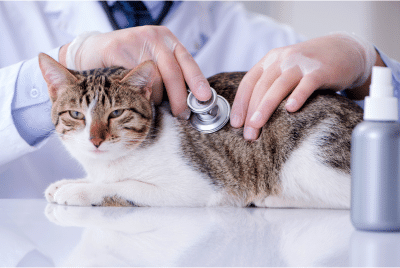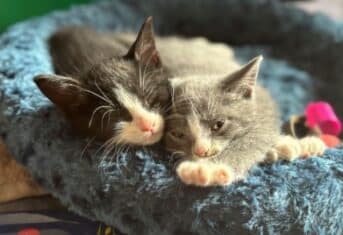Finally, a Treatment for FIP: How GS-441524 is Saving Cats’ Lives

Finally, a Treatment for FIP: How GS-441524 is Saving Cats’ Lives
June is Adopt a Shelter Cat Month, and we’re highlighting our feline friends throughout the month with a series of cat-focused posts. Last week’s blogpost highlighted the health risks of feline obesity for your cat. This week’s blogpost announces the most fabulous feline news about an old disease: a new medication to treat feline infectious peritonitis (FIP), a disease plaguing cats for decades.
Defining Feline Infectious Peritonitis
The earliest description of FIP was in The Cornell Veterinarian in 1963 by a pioneer in feline medicine, Dr. Jean Holzworth. In her article entitled “Some Important Disorders of Cats,” she described “a peculiar entity with a definite predilection for cats is chronic fibrinous peritonitis, in which the fibrin deposited on the abdominal organs, especially the liver and spleen, gradually organizes into a tough pale fibrous coating.” We now know this disease to be FIP, caused by a coronavirus (unrelated to the COVID-19 coronavirus). Peritonitis, or inflammation of the abdominal cavity, is only one feature of this systemic disease, which can cause ocular inflammation, neurological signs, liver problems, and fluid around the lungs. Many cats with FIP have yellow tinted skin (jaundice) and a fever. If that list of problems sounds bad, it gets worse. Feline infectious peritonitis is invariably fatal. Since 1963, FIP has been an untreatable disease of delightful kittens and young cats, especially purebred ones. Fortunately, everything has changed for these poor cats in recent years.
New Hope for FIP-Positive Cats
A few years back, at an American College of Veterinary Internal Medicine seminar, I heard a very famous feline virologist talk about his work in FIP. Dr. Niels Pedersen from the University of California at Davis was working with some antiviral compounds against coronaviruses and tested them in cats with FIP. Miraculously, some of the drugs worked, particularly an antiviral known as GS-441524, making really sick cats better in just days. Veterinarians in the Europe and Australia have been prescribing these drugs for a while, but veterinarians in the United States couldn’t because GS-441524 is not approved in the United States. But news of miracles travels fast, and it didn’t take cat families long to set up Facebook groups and figure out how to obtain these drugs for their cats on the black market. This was a perilous situation for owners, legally, and for their pets, medically, as these black market drugs were of unreliable purity and composition. Clearly, something had to change for American cat owners.
GS-441524 Comes to America
On May 10th, the FDA announced a new position on the use of compounded GS-441524 to treat FIP. Normally creating a drug (“compounding” in pharmacy terms) from an unapproved drug is not allowed by the FDA. However, the FDA decided to waive this regulation in the case of GS-441524 under certain conditions. Following that announcement, Stokes Pharmacy and the Bova Group, the manufacturer of GS-441524 in Europe and Australia, announced a collaboration to produce oral GS-441524 for American cats.
American veterinarians can now prescribe an effective medication for cats with FIP; cats across the country will be rejoicing at this year’s Jellicle Ball.
Fun fact about Dr. Jean Holzworth: she spent time working at AMC’s old Speyer Hospital at 350 Lafayette Street before being accepted to veterinary school.

































